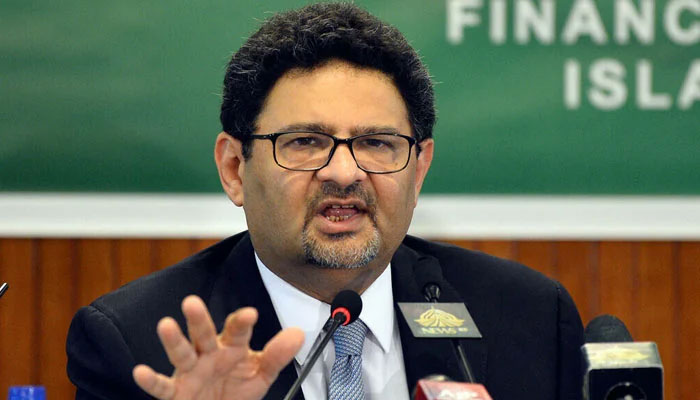Taxes should be enforced evenly on all sectors: Miftah
It was problematic that there were manufacturers of tobacco who do not pay their taxes: Miftah
ISLAMABAD: Former minister for finance Miftah Ismail said that there was a need to enforce taxes evenly on all sectors including tobacco and others.
He said that it was problematic that there were manufacturers of tobacco who do not pay their taxes.
“There is need to ensure that everybody pay the imposed taxes,” Miftah Ismail stated in Geo TV programme titled “Mukalima for Economic Stability” aired on Sunday. The programme was anchored by Shahid Maitala and was participated by IPSOS CEO Abdul Sattar Babar, former minister for finance Miftah Ismail and journalist Mehtab Haider.
Miftah Ismail said that everyone who was a cigarette manufacturer in AJK or another parts of the country should pay the taxes evenly.
On real estate, he said that the tax on property was not the domain of the federal government and same was the case about GST on services. The agriculture income also falls under the jurisdiction of the provinces. He said that the Center provided bulk of financial resources to the provinces under the NFC award so the provinces did not have need to generate its own resources through imposition of such taxes. The Centre can only slap tax on value of plot but it cannot slap tax on property. He said that everyone in Pakistan was paying taxes especially indirect taxes on whatever he or she bought from the market. So, the poor paying more taxes disproportionate to its income compared to rich and affluent classes. The rich parked their money in real estate so there is need to slap taxes on those real estate which was used for speculative gains. There is also need to get taxes from those who inherited land from generation to generation, he said and added that he did not have problem for generating wealth but they must contribute something to tax net.
The country cannot run with tax to GDP ratio at 9.8 percent so for meeting all expenses requirement the rich people will have to contribute, Miftah Ismail said.
The CEO IPSOS Abdul Sattar Babar stated that the volume of the undocumented economy was phenomenal as overall size of economy stood at $310 billion. It is stated that the informal sector of the economy was almost 100 percent so the size of the economy was actually hovering around $620 billion. If the size of the informal economy was taken into account in the range of 200 to 300 percent then the overall size of the economy touched $900 billion mark. The tax to GDP ratio, he said, was quite low and tax policies also caused inability to expand the narrowed tax base. The people of Pakistan cannot be convinced about payment of taxes honestly and what they will get in return after paying their due taxes.
He said that they tracked five major sectors from last few years including real estate, tobacco and others causing losses to the national exchequer to the tune of Rs1,000 billion on annual basis.
Mehtab Haider stated that there was a need to integrate data for the purpose of taxability. There is a need of more coordination among the center and provinces for integration of taxes instead of pursuing fragmented taxation system.
-
 Victoria Wood's Battle With Insecurities Exposed After Her Death
Victoria Wood's Battle With Insecurities Exposed After Her Death -
 Prince Harry Lands Meghan Markle In Fresh Trouble Amid 'emotional' Distance In Marriage
Prince Harry Lands Meghan Markle In Fresh Trouble Amid 'emotional' Distance In Marriage -
 Goldman Sachs’ Top Lawyer Resigns Over Epstein Connections
Goldman Sachs’ Top Lawyer Resigns Over Epstein Connections -
 How Kim Kardashian Made Her Psoriasis ‘almost’ Disappear
How Kim Kardashian Made Her Psoriasis ‘almost’ Disappear -
 Gemini AI: How Hackers Attempt To Extract And Replicate Model Capabilities With Prompts?
Gemini AI: How Hackers Attempt To Extract And Replicate Model Capabilities With Prompts? -
 Palace Reacts To Shocking Reports Of King Charles Funding Andrew’s £12m Settlement
Palace Reacts To Shocking Reports Of King Charles Funding Andrew’s £12m Settlement -
 Megan Fox 'horrified' After Ex-Machine Gun Kelly's 'risky Behavior' Comes To Light
Megan Fox 'horrified' After Ex-Machine Gun Kelly's 'risky Behavior' Comes To Light -
 Prince William's True Feelings For Sarah Ferguson Exposed Amid Epstein Scandal
Prince William's True Feelings For Sarah Ferguson Exposed Amid Epstein Scandal -
 Nick Jonas Gets Candid About His Type 1 Diabetes Diagnosis
Nick Jonas Gets Candid About His Type 1 Diabetes Diagnosis -
 King Charles Sees Environmental Documentary As Defining Project Of His Reign
King Charles Sees Environmental Documentary As Defining Project Of His Reign -
 James Van Der Beek Asked Fans To Pay Attention To THIS Symptom Before His Death
James Van Der Beek Asked Fans To Pay Attention To THIS Symptom Before His Death -
 Portugal Joins European Wave Of Social Media Bans For Under-16s
Portugal Joins European Wave Of Social Media Bans For Under-16s -
 Margaret Qualley Recalls Early Days Of Acting Career: 'I Was Scared'
Margaret Qualley Recalls Early Days Of Acting Career: 'I Was Scared' -
 Sir Jackie Stewart’s Son Advocates For Dementia Patients
Sir Jackie Stewart’s Son Advocates For Dementia Patients -
 Google Docs Rolls Out Gemini Powered Audio Summaries
Google Docs Rolls Out Gemini Powered Audio Summaries -
 Breaking: 2 Dead Several Injured In South Carolina State University Shooting
Breaking: 2 Dead Several Injured In South Carolina State University Shooting




